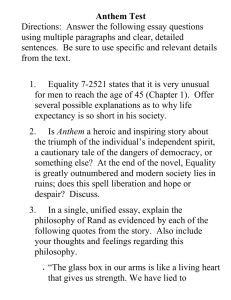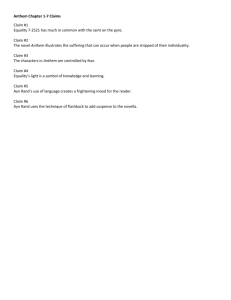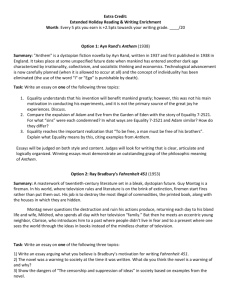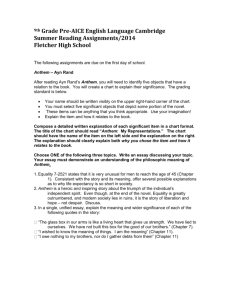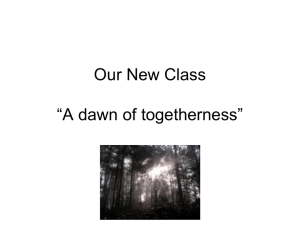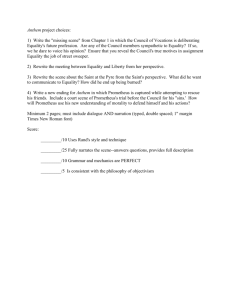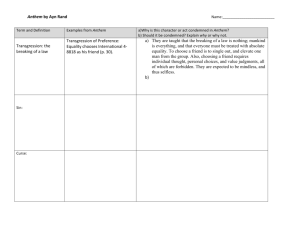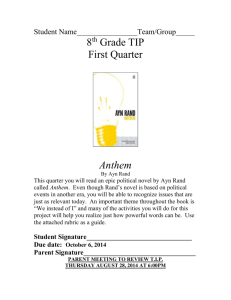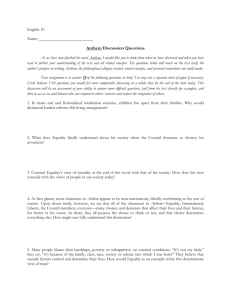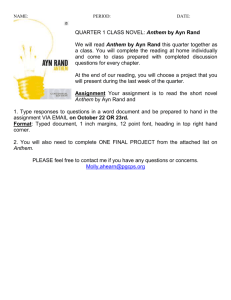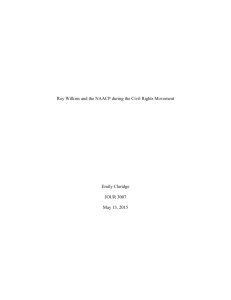Anthem - kwilkins
advertisement
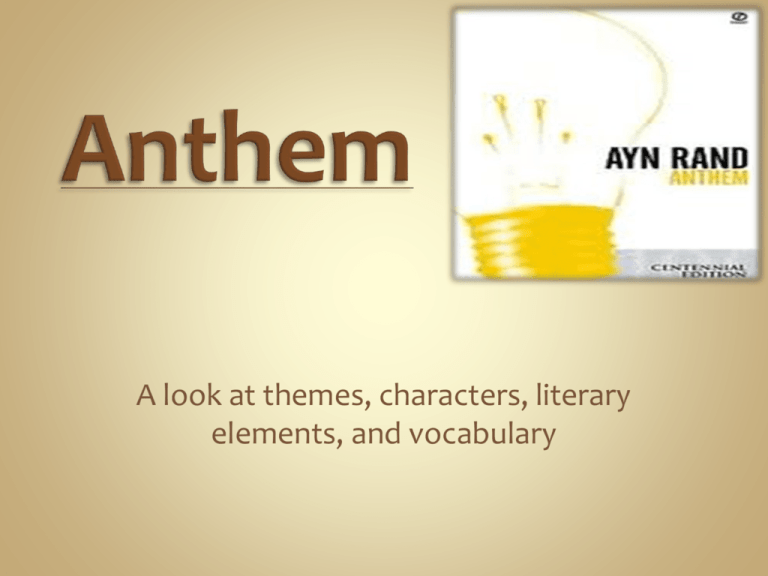
A look at themes, characters, literary elements, and vocabulary Ayn Rand was born in Russia in 1905. She was educated under Communist rule, experiencing first-hand the horrors of totalitarianism. She escaped from Russia in 1926 and came to America because of its individualist philosophy. Anthem was written in 1937, about the essence of collectivism. Communism is a social structure in which classes are abolished and property is commonly controlled, as well as a political movement that advocates and aims to create such a society. A society in which each person is equally treated from street-sweepers to doctors. Each received the same amount of food, clothes, and shelter. "Pure communism" in the Marxian sense refers to a classless, stateless and oppression-free society where decisions on what to produce and what policies to pursue are made democratically, allowing every member of society to participate in the decision-making process in both the political and economic spheres of life. In modern usage, communism is often used to refer to the policies of the various communist states that had ownership of all the means of production and economies. I will show you a poem and read it twice. Choose one of the following to write about. Write for ten minutes. Do not stop. Put today’s date on your writing. Respond to the poem. What does it make you think of? What “catches your ear”? Copy one line of the poem and use it to start your writing. Let the line lead your thinking. Write about something unrelated of your choosing. Out of the night that covers me, Black as the Pit from pole to pole, I thank whatever gods may be For my unconquerable soul. In the fell clutch of circumstance I have not winced nor cried aloud. Under the bludgeonings of chance My head is bloody, but unbowed. Beyond this place of wrath and tears Looms but the Horror of the shade, And yet the menace of the years Finds, and shall find me, unafraid. It matters not how strait the gate, How charged with punishments the scroll, I am the master of my fate; I am the captain of my soul. Essentially, Anthem is a novel about being the captain of your soul and not allowing others to dictate who you are. Pronouns are words that “stand in” for nouns. For instance, this is a much less awkward sentence if we use pronouns: Mrs. Wilkins announced to Mrs. Wilkins’ students that Mrs. Wilkins would not see Mrs. Wilkins’ students Wednesday. How can we fix this awful sentence? Singular pronouns “stand in” for singular nouns. For example, Bill = he or him Mary = she or her Mrs. Wilkins = I or me People = they or them or we or us Genre: Anti-Utopian (meaning that the world presented is the world as it should not be). Setting: (time) · In the future, after the collapse of the social order. (place) · An unidentified city; much of the first half of Anthem is narrated from a tunnel underground where Equality 7-2521 is hiding, and the second half is narrated from a forest where he has taken refuge from society. Tense: Present, with some past-tense narration Point of view: Equality 7-2521 speaks in the first person, but does not refer to himself as “I”. Instead, he uses “we”. Equality 7-2521: A street sweeper The protagonist Narrator of the story Has a curse of being different from his brothers, being an individual. Liberty 5-3000: The golden one Lives in the home of the peasants Fear: In this story, fear is used to keep a tight grasp on the collective society. “There is fear hanging in the air of the sleeping halls, and in the air of the streets. Fear walks through the city, fear without name, without shape. All men feel it and none dare to speak.” (Rand, pg. 46). INDIVIDUALISM COLLECTIVISM “Regarding every man as an independent, sovereign entity who possesses an inalienable right to his own life, a right derived from his nature as a rational being.” Ayn Rand. Not being ruled over Not ruling Not being a master or a slave. The subjugation of the individual to the group The Anthem society No right to a private existence No right to lead your own life, pursue own happiness, or use own property EGOISM SELFLESSNESS Concern with one’s own The self is destroyed in a interests collectivist society Live for own happiness No personal names Unconquerable human spirit Individuals are “This one god, this one interchangeable word, ’I,’” No preferences “The sacred EGO.” It is wrong to disagree It is wrong to have independent thoughts It is wrong to ask questions Light: Light represent truth. The forest: Manuscripts: The manuscripts are important because Equality uses Only when light is brought to bear can those with exceptional qualities be separated from the crowd. The city is dingy and dark. The only colors there are gray, white, and brown. The whole society lives by candlelight and the leaders fear the light when Equality brings it to them. In contrast, the house Equality and the Golden One find in the forest has many windows that let light in. The forest is a connection between the past and the future. It also allows Equality to live freely and alone, an opportunity denied in society. them to write his own thoughts not shared by the entire community. His record of his thoughts represents his first break with society. Metaphor: A figure of speech in which a word for one idea or thing is used in place of another to suggest a likeness between them. Collective- More than being a metaphor for the Russian state, Anthem’s collective society represents the forces of socialism and altruism (interest in the welfare of others) everywhere. Robert Frost The Road Not Taken TWO roads diverged in a yellow wood, And sorry I could not travel both And be one traveler, long I stood And looked down one as far as I could To where it bent in the undergrowth; Then took the other, as just as fair, And having perhaps the better claim, Because it was grassy and wanted wear; Though as for that the passing there Had worn them really about the same, And both that morning equally lay In leaves no step had trodden black. Oh, I kept the first for another day! Yet knowing how way leads on to way, I doubted if I should ever come back. I shall be telling this with a sigh Somewhere ages and ages hence: Two roads diverged in a wood, and I— I took the one less traveled by, And that has made all the difference. What metaphor does Robert Frost’s poem use? How does it compare with Anthem? Syntax/ style: The manner of linguistic expressionhow the writer or speaker says whatever it is they say. There is no use of “I”. The language is very formal with very few instances of embellishment. Tone: The attitude of the author toward his/her subject- the emotion evoked in the reader by the text. Equality 7-2521 records his thoughts and actions in a straightforward manner, with no trace of irony. Ailment: bodily disorder Alms: something given to relieve the poor Atone: to make amends Avert: to ward off Befall: to happen to Covet: to desire or envy Decree: to order Edict: order Ego: the self distinguished from the others Fathom: to come to understand, a unit of length Infamy: evil reputation Larder: a place where foods are kept Mandate: a command Pyre: a combustible mound for burning a dead body Reprimand: a severe scolding Sanction: approval Transgression: sin Vindicate: avenge Vocation: job or career Warrant: justification
